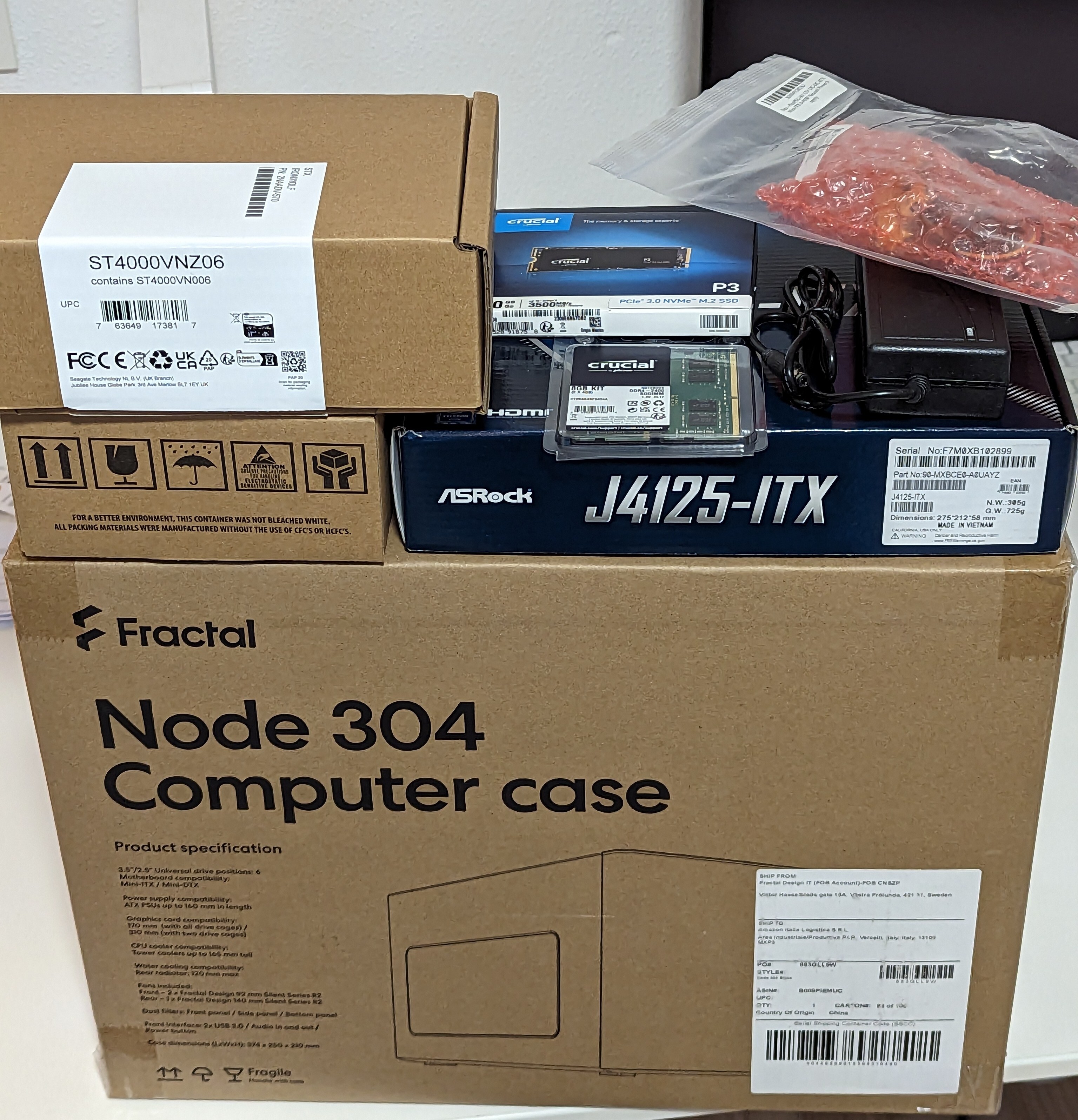I'm building a NAS for the first time on my own, so I wanted to share the story so far here.
I'm not a stranger to custom builds, in fact I don't think I ever bought an assembled PC (not counting second hand 386 box a million years ago). But this is my first small, low power build, so it's not perfect, I already ran into a wall (more later).
I base the build on an AsRock mini-ITX board, the CPU is included, it's passively cooled, low power consumption but still powerful for a NAS. I'm sticking it into a Node 304 Fractal Design case. Here's the full list of parts I got:
- AsRock J4125-ITX board with a Celeron 4125 (4-core CPU)
- 8GB DDR4 RAM (a Crucial kit)
- a 500GB NVMe SSD (which I can't use)
- a couple of Seagate IronWolf 4TB drives
- 90W PicoPSU and some no-name power brick
- Fractal Design Node 304 mini-ITX case.
I planned to have an SSD for OS, these two disks for my photography and media, and then later on expand with more storage (preferably SSD, when I can afford it).
As mentioned, I messed up: the M2 slot on the motherboard is a "Key E" slot. I never bothered with these keys before, so I didn't know that a Key E slot does not have a SATA protocol, it won't take my SSD.
Another thing, the PicoPSU is a 20-pin power supply, and the board has a 24-pin slot. It should still be fine, the specs say that this is still okay, but I'll have to see. According to my back-of-the-napkin calculations, 90 Watts should be enough power for the mobo and CPU, the SSD and the two spinning disks.
Anyway I'll get a regular SATA SSD tomorrow and see how it's shaping up. Let me know if you want me to post more on my progress/end result or if you have any questions.

These kinds of posts are very helpful, thanks!
The Celeron gave me pause, because I remember them from way back as being underpowered CPUs for cheaper laptops. Seems like they would drag down performance a bit on a new build, especially for CPU intensive media management? Unless the situation is different with newer Celerons and they're much better for performance?
My old HP laptop was referred to as having celery for a CPU. It was about capable of using Chrome without having a breakdown.
Better than having a potato as a CPU, I s'pose
Good thing I'm not gonna run Chrome on this :)
Well, look at these few things:
Modern CPUs, even Celerons, are powerful. People are driving a lot of workload even on ARM CPUs, and this is a proper 4-core x64 CPU. I mean, look at your phone, it's most likely doing a lot of full-hd media, right? And it's doing just fine.
Most commercially-available Home/Small Office NAS systems, by Synology, Asustor, QNAP and others, they have either CPUs in this class, or weaker, ARM CPUs. I'm not gonna be sitting at this box. I have 3 desktops and 3 laptops around the house for work - this is gonna be mostly storage.
My planned media management workload is a bit different than media processing. I mostly want to serve files around, maybe transcode something in the background. I don't plan to watch movies off of this (yet). I have a 4-core Hetzner VPS that is similar in power to this, and it's driving something like 4-5 docker containers and still serving all the files.
I think it's gonna be fine, but we shall see.
Yeah, that's fair, I have an Odroid HC2 with an arm32 server which easily handles Plex atreaming, qB, *arrs, etc. I think it's just nostalgic prejudice on my part! I don't doubt that it'll handle your workload just fine.
I also didn't think much of them, but when I compare this with off-the-shelf Synology or QNAP (in the consumer-grade, like I'm building), the Celeron is a beast :)